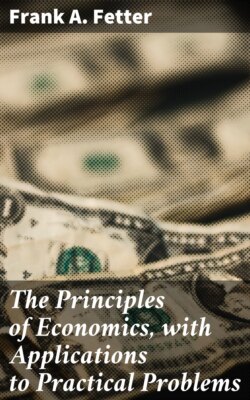Читать книгу The Principles of Economics, with Applications to Practical Problems - Frank A. Fetter - Страница 28
На сайте Литреса книга снята с продажи.
§ I. EXCHANGE OF GOODS RESULTING FROM DEMAND
ОглавлениеReciprocal demand becomes exchange
1. Exchange in the usual economic sense is the transfer of two goods by two owners, each of whom deems the good taken more than a value-equivalent for the one given. The comparison of goods that has been discussed above is a kind of exchange. When a person chooses one thing rather than another, one form of gratification may be said to be mentally exchanged for another. This is exchange in that person's mind, or subjective exchange. But the word "exchange" as usually employed means an exchange of goods between persons. It is objective exchange, and when the word is used without modification, it is to be understood in the objective sense. In the last chapter were analyzed the motives of the individual man. Robinson Crusoe on his desert island would in very many ways be acted upon by the same motives in reference to economic goods that men are in society. Yet, it is exchange in society and the complicated problems arising from this transfer of goods from person to person that constitute nearly the whole of the subject-matter of political economy.
Exchange is seen to arise out of the differences in the situations of men with reference to goods. The different subjective valuations give rise to demand, and demand leads to exchange. In early societies differences in natural products were the most usual causes of exchange. Salt, though so essential to life, is found in few places. The metals early became indispensable for weapons of defense or for the chase, and were sought far and wide. Rare shells, feathers, jewels, and the precious metals appealed in early times to a universal desire for ornament. Products like these are the objects of a rude sort of exchange in the first simple efforts made to adjust possessions to wants. Within the tribe, differences in the skill and ability of men to produce arrow heads or weapons or ornaments, bring about the exchange of goods.
Mutual advantage in exchange
2. The advantage of exchange consists in the raising of the want-gratifying power of goods to both parties. It generally was assumed by medieval thinkers that if one party to an exchange gained, the other must lose. The mistaken idea prevailed that value is something fixed in the good, and unchangeable. Where the exchange is voluntary (and only that kind is here being considered), it is mutual advantages which make the exchange rational. Many false conclusions on practical questions still result from a failure to grasp this simple truth. It follows from this that the act of exchange is itself useful, for goods having a small importance to men are given a higher importance by being brought into better relations with wants. Merchants, peddlers, traders, and common carriers of all sorts, therefore, are adding to the utility of goods. This idea has been only slowly apprehended, but is now one of the least disputed propositions in economics.
Demand is supply in another aspect
3. Barter is the exchange of goods without the use of money. Either one of the goods traded in cases of barter may be considered as sold, and either one as bought, according as the matter is looked at from the standpoint of the one or the other party to the exchange. Demand, therefore, is supply, and supply is demand when the point of view is shifted from one party to another. The fisherman's demand for venison is expressed in terms of fish; the hunter's demand for fish is expressed in terms of venison. But to the fisherman the venison is the supply offered to him. The term "marginal utility" of a good, therefore, does not refer merely to the demand of the consumer; for it expresses by a single phrase the idea both of demand and of supply. The utility of the goods composing the supply is expressed in terms of the goods that represent demand and vice versa. The only way in which man can give definite, concrete, numerical expression to his desire for goods is to state it in terms of other goods. In expressing numerically, in terms of other objects, an estimate of the utility of an apple, a horse or a house, one inevitably gives expression to a ratio of exchange; demand for one good is the offer of another good.
